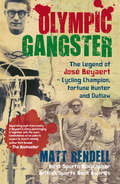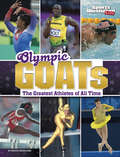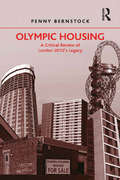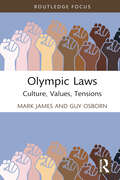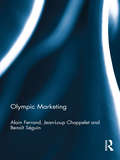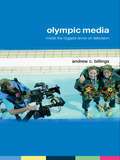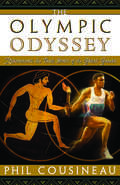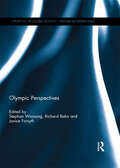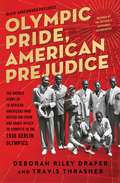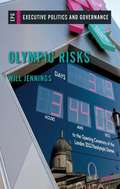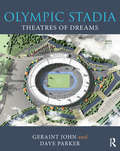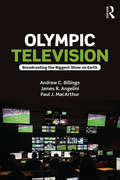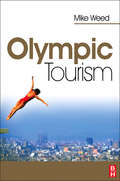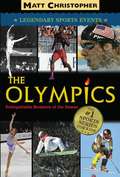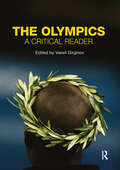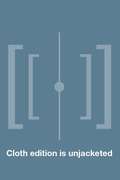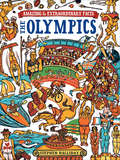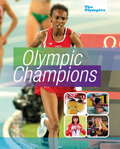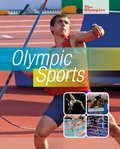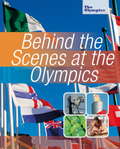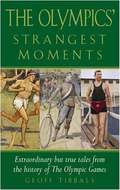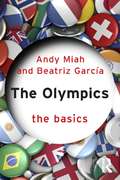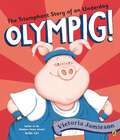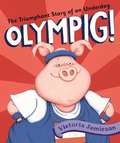- Table View
- List View
Olympic Gangster: The Legend of José Beyaert - Cycling Champion, Fortune Hunter and Outlaw
by Matt RendellRestlessly vital and possessed of great physical strength, José Beyaert lived many lives. During the Second World War, he boxed and trafficked arms for the Resistance on his bicycle. After it, he became an international cyclist. In 1948, a mile from the end of the Olympic road race around Windsor Park, he broke away alone to take the gold medal and started an adventure that would last the rest of his life. A Tour de France rider in the sport's golden age, José was invited to open a new velodrome in Colombia, South America. He travelled, intending to stay a month. Instead, driven by his thirst for adventure, he stayed for fifty years, becoming by turns athlete, coach, businessman, emerald-trader, logger, smuggler, perhaps even hired killer. Matt Rendell, who knew José Beyaert and met many of his family, friends and associates, tells the fascinating story of an almost-forgotten sporting hero who, incapable of living by other people's rules, lived his many lives on his own terms.
Olympic GOATs: The Greatest Athletes of All Time (Sports Illustrated Kids: GOATs)
by Bruce BerglundHow do you pick Olympic GOATs? Is it gymnast Simone Biles or swimmer Michael Phelps? Or maybe it’s the entire 1992 basketball team. With so many sports, how do you choose? It comes down to stats, history, and hunches. Read more about some of the legends of the Olympic Games and see if you agree that they’re the greatest of all time.
Olympic Housing: A Critical Review of London 2012's Legacy
by Penny BernstockOne of the distinguishing characteristics of London's bid to host the games was its commitment to legacy where it was argued that ’the legacy would lead to the regeneration of an entire community for the direct benefit of everyone who lives there’. This book adopts a critical approach to the concept of 'legacy' focussing specifically on housing. It argues there will be a range of both intended and unintended legacy outcomes and an urgent need for revised strategies if those original objectives are to be achieved. The concept of legacy is explored in a number of ways, including an overview of housing legacy in other host cities; the experiences and perspectives of those residents decanted to make way for the Olympic Park; a critical review of legacy plans; a detailed analysis of the conversion of the Athletes’ Village into housing; and a case study of the emerging area ’Stratford High Street’, which explores issues of social class change and the limitation of planning policies. Whilst taking housing as its focus, this book adopts a sociological perspective by exploring the likelihood of social class change in order to draw conclusions about 'gentrification', 'social polarisation' and the extent to which 'social inclusion' is reflected in housing legacies.
Olympic Laws: Culture, Values, Tensions (Routledge Focus on Sport, Culture and Society)
by Mark James Guy OsbornOlympic Laws: Culture, Values, Tensions is the first book to analyse fully the Olympic legal framework and its application to the IOC and the Olympic Games through a socio-legal lens. It opens up a new window into understanding the Olympic Games across recent iterations of the Games and on to future Games. The book begins by defining the parameters of the emergent legal sub-fields of Sports Law, lex Olympica and Olympic Law, through the identification of the sources of these Olympic Laws and their underpinning norms. It then uses a series of case studies to demonstrate how lex Olympica has evolved as a means of defending the Olympic Movement from unwanted legal interventions, how Olympic Law has been created to protect the commercial rights vested in the Games, and how the legacies created by this unique category of law have a lasting impact on host cities and beyond. It concludes with a call that the IOC should recalibrate its relationships with prospective hosts and the participating athletes by requiring specific adherence to the Fundamental Principles of Olympism. This is essential reading for any student or researcher with an interest in Olympic studies, sports law, or socio-legal studies or any practising lawyer or events professional looking to better understand the impact and institutions of mega-events.
Olympic Marketing
by Alain Ferrand Jean-Loup Chappelet Benoit SeguinThe Olympic Games have become the definitive sports event, with an unparalleled global reach and a remarkably diverse constituency of stakeholders, from the IOC and International Federations to athletes, sponsors and fans. It has been estimated, for example, that 3.6 billion people (about half of the world population) watched at least one minute of the Beijing Games in 2008 on television. The driving force behind the rise of the modern Olympics has been the Olympic marketing programme, which has acted as a catalyst for cooperation between stakeholders and driven the promotion, financial security and stability of the Olympic movement. This book is the first to explain the principles of Olympic marketing and to demonstrate how they can be applied successfully in all other areas of sports marketing and management. The book outlines a strategic and operational framework based on three types of co-productive relationships (market, network and informal) and explains how this framework can guide professional marketing practice. Containing case studies, summaries, insight boxes and examples of best practice in every chapter, this book is important reading for all students and practitioners working in sports marketing, sports management or Olympic studies.
Olympic Media: Inside the Biggest Show on Television (Routledge Critical Studies in Sport)
by Andrew C BillingsLocated in the United States, NBC (National Broadcasting Company) is the biggest and most powerful Olympic network in the world, having won the rights to televise both the Summer and the Winter Olympic Games. By way of attracting more viewers of both sexes and all ages and ethnicities than any other sporting event, and through the production of breathtaking spectacles and absorbing stories, NBC’s Olympic telecasts have huge power and potential to shape viewer perceptions. Billings’s unique text examines the production, content, and potential effects of NBC’s Olympic telecasts. Interviews with key NBC Olympic producers and sportscasters (including NBC Universal Sports and Olympics President Dick Ebersol and primetime anchor Bob Costas) outline the inner workings of the NBC Olympic machine; content analyses from ten years of Olympic telecasts (1996-2006) examine the portrayal of nationality, gender, and ethnicity within NBC’s telecast; and survey analyses interrogate the extent to which NBC’s storytelling process affects viewer beliefs about identity issues. This mixed-method approach offers valuable insights into what Billings portrays as "the biggest show on television".
The Olympic Odyssey
by Phil CousineauThis book was purchased by the US Olympic Committee and given to each member of the US Olympic Team of the Summer 2004 Games as well as those participating in the Special Olympics. Nothing draws people together quite like sports. This book explores exactly why that is. In anticipation of the nostalgic return of the Games to Greece in 2004, mythologist and life-long athlete Phil Cousineau has produced a work that, unlike other titles on the subject, delves deeply into the spiritual dimension of the Olympics and potentially all athletic activity.Reaching far back to the mythic and historic origins of the Games nearly 3,000 years ago, Cousineau examines the driving motivation behind these first ancient gatherings, which was peaceful competition in an atmosphere of fair play and brotherhood, as well as the pursuit of excellence in mind, body, and spirit. And following through to the present day, he describes how these same ideals still compel coaches, athletes, and fans to sports arenas today, despite obstacles with doping and bribery we occasionally find in the modern Games.A collector's dream, this book contains ancient and contemporary illustrations, historic facts, anecdotes, famous quotes, and interviews with Olympic athletes, including three-time medalist Sarunas Marciulionis of Lithuania and legendary swimmer Matt Biondi. Also featured are excerpts from Cousineau's interviews about the cultural role of sports with mythologist Joseph Campbell and religious historian Huston Smith.The Olympic Odyssey is written for all fans of the game of life who esteem true leadership, aspire to personal wholeness, and seriously question the cultural obsession with winning at all costs. Ultimately, it suggests the deepest reason we so love great athletes is for how they encourage us to achieve the highest level of being possible in our own lives, no matter what the arena in which we play.
The Olympic Odyssey
by Phil CousineauNothing draws people together quite like sports. This book explores exactly why that is. In anticipation of the nostalgic return of the Games to Greece in 2004, mythologist and life-long athlete Phil Cousineau has produced a work that, unlike other titles on the subject, delves deeply into the spiritual dimension of the Olympics and potentially all athletic activity.Reaching far back to the mythic and historic origins of the Games nearly 3,000 years ago, Cousineau examines the driving motivation behind these first ancient gatherings, which was peaceful competition in an atmosphere of fair play and brotherhood, as well as the pursuit of excellence in mind, body, and spirit. And following through to the present day, he describes how these same ideals still compel coaches, athletes, and fans to sports arenas today, despite obstacles with doping and bribery we occasionally find in the modern Games.A collector's dream, this book contains ancient and contemporary illustrations, historic facts, anecdotes, famous quotes, and interviews with Olympic athletes, including three-time medalist Sarunas Marciulionis of Lithuania and legendary swimmer Matt Biondi. Also featured are excerpts from Cousineau's interviews about the cultural role of sports with mythologist Joseph Campbell and religious historian Huston Smith.THE OLYMPIC ODYSSEY is written for all fans of the game of life who esteem true leadership, aspire to personal wholeness, and seriously question the cultural obsession with winning at all costs. Ultimately, it suggests the deepest reason we so love great athletes is for how they encourage us to achieve the highest level of being possible in our own lives, no matter what the arena in which we play.
Olympic Perspectives (Sport in the Global Society - Historical Perspectives)
by Stephan Wassong, Richard Baka and Janice ForsythHistorical research on the Olympic Movement is highly valuable as it displays processes of continuity and transformation by which knowledge building processes on the Olympic Movement, its structure and on Olympic sport can be expanded. The Olympic Movement can be addressed from multidisciplinary perspectives, including management, sociology, education, philosophy and history. This comprehensive collection examines the multifaceted profile of the Olympic and Paralympic Movement and presents new insights drawn from a variety of research projects. Historical and political dimensions of the Olympic and Paralympic Movement are addressed, along with educational, ethical, commercial and sociological perspectives.This book was originally published as a special issue of The International Journal of the History of Sport.
Olympic Pride, American Prejudice: The Untold Story of 18 African Americans Who Defied Jim Crow and Adolf Hitler to Compete in the 1936 Berlin Olympics
by Deborah Riley Draper Blair Underwood Travis ThrasherDiscover the astonishing, inspirational, and largely unknown true story of the eighteen African American athletes who competed in the 1936 Berlin Olympic Games, defying the racism of both Nazi Germany and the Jim Crow South.Set against the turbulent backdrop of a segregated United States, sixteen black men and two black women are torn between boycotting the Olympic Games in Nazi Germany or participating. If they go, they would represent a country that considered them second-class citizens and would compete amid a strong undercurrent of Aryan superiority that considered them inferior. Yet, if they stayed, would they ever have a chance to prove them wrong on a global stage? To be better than anyone ever expected? Five athletes, full of discipline and heart, guide readers through this harrowing and inspiring journey. There&’s a young and sometimes feisty Tidye Pickett from Chicago, whose lithe speed makes her the first African American woman to compete in the Olympic Games; a quiet Louise Stokes from Malden, Massachusetts, who breaks records across the Northeast with humble beginnings training on railroad tracks. We find Mack Robinson in Pasadena, California, setting an example for his younger brother, Jackie Robinson; and the unlikely competitor Archie Williams, a lanky book-smart teen in Oakland takes home a gold medal. Then there&’s Ralph Metcalfe, born in Atlanta and raised in Chicago, who becomes the wise and fierce big brother of the group. Drawing on over five years of research, Draper and Thrasher bring to life a timely story of perseverance and the will to beat unsurmountable odds. From burning crosses set on the Robinsons&’s lawn to a Pennsylvania small town on fire with praise and parades when the athletes return from Berlin, Olympic Pride, American Prejudice is full of emotion, grit, political upheaval, and the American dream. Capturing a powerful and untold chapter of history, the narrative is also a celebration of the courage, commitment, and accomplishments of these talented athletes and their impact on race, sports and inclusion around the world.
Olympic Risks
by Will JenningsThe task of governing the Olympic Games and the Olympic movement now takes place in an age in which states and societies are increasingly organized in response to risk. At the heart of the risk management in organising the Olympics is the tension between the inherent riskiness of mega-events, which is attributable to their scale and complexities, combined with immense societal, political and organisational pressures for the management of risk. Over time, too, staging the Olympics has become more complex, and riskier, as a consequence of its growing scale and commercial success. Since the 1980s, a profound transformation has occurred in how the Games are organised and governed, with the increased transfer of risk to the market and the spread of regulation as a mode of governance and the formal practice of risk management across functions ranging from finance to security to critical infrastructures to public health. This book is a unique theoretical and empirical analysis of how the Olympic Games are governed, exploring the challenges and pressures of staging the world's largest event and the recent emergence of the formal practice of risk management as a response of decision-makers to the operational demands and complexities of the Games.
Olympic Stadia: Theatres of Dreams
by Geraint John Dave ParkerOlympic Stadia provides a comprehensive account of the development of stadia including but not limited to: developments in running tracks, the introduction of lighting, improvements in spectator viewing standards and the introduction of roofs. Written by a world-renowned expert on sports architecture, the book: Systematically analyses every stadium from Athens 1896 to Tokyo 2020 Provides drawings, plans, elevations, photographs and illustrations in full colour Considers the fundamental changes wrought by the incorporation of the Paralympic Games Looks at the impact on host cities and their urban infrastructure, and considers the long-term legacies and massive investments that Olympic stadia require Explores the effects of the demands of the world’s TV broadcasters. An invaluable and beautiful resource for practical insight and inspiration, this book makes essential reading for anyone interested in Olympic stadia.
Olympic Television: Broadcasting the Biggest Show on Earth
by Andrew C. Billings James R. Angelini Paul J. MacArthurAs the Olympic spectacle grows, broadcast coverage becomes bigger, more complex, and more sophisticated. Part sporting event, part reality show, and part global festival, the Olympics can be seen as both intensely nationalistic and a celebration of a shared sense of international community. This book sheds new light on how the Olympic experience has been shaped by television and expanded across multiple platforms and formats. Combining a multitude of approaches ranging from interviews to content analyses to audience surveys, the book explores the production, influence, and significance of Olympic media in contemporary society. Built on a central case study of NBC’s coverage of the Rio Games in 2016, which is then placed within 20 years of content analyses, the book focuses on the entire Olympic television process from production to content to effects. Touching on key themes such as race, gender, history, consumerism, identity, nationalism, and storytelling, Olympic Television: Broadcasting the Biggest Show on Earth is fascinating reading for any student or scholar with an interest in sport, media, and the global impact of mega-events.
Olympic Tourism
by Mike WeedOlympic Tourism is the first text to focus on the nature of Olympic tourism and the potential for the Olympic Games to generate tourism in the run up to and long after the hosting of a Games. The awarding of the 2012 Olympics to London will see an increasing interest in the phenomena of organising, managing and analysing the issues which surround mega-event sport tourism. This text will address these issues and using detailed case analysis of previous and future games, discuss how to maximise the success of managing tourism at these events. Written from an international perspective this text provides the reader with: An exploration of the relationship between sport, tourism and the Olympic Games A guide on how to establish Olympic tourism as a phenomenon that goes far beyond the visits of spectators, athletes, officials and dignitaries during the Games themselves. An examination of the detail of Olympic tourism flows before, during and after the Games Analysis of the requisite partnerships between a range of sport, tourism, Olympic and other agencies to successfully leverage and deliver maximum tourism benefits The tools to draw lessons from case studies of previous and forthcoming winter and summer Olympic Games in the 21st Century A discussion of the potential tourism legacies of the Olympic Games Olympic Tourism is a timely response to this international interest and will be an essential resource for those studying and teaching on sport, tourism and the Olympics.
The Olympics: Legendary Sports Events
by Matt ChristopherAsk most Olympians how their story begins and they will answer, "When I was young, I always dreamed of going to the Olympics. . ." Some will then go on to tell of their great athletic triumphs. Others will recall agonizing near-misses. But for most, the very fact that they reached the Games at all was a dream come true. For the Olympic Games offer athletes something few others sporting events can: the chance to be recognized as the best in the world at a chosen sport. With stories of great triumphs and great tragedies, the Olympics not only embodies the competitive human spirit, but also sets a stage stage for foreign relations and politics. Historical references combined with amazing sports stories give this book both an educational and exciting appeal.
The Olympics: A Critical Reader
by Vassil GirginovThe Olympics: A Critical Reader represents a unique, critical guide to the definitive sporting mega-event and the wider phenomenon it represents – Olympism. Combining classic texts and thoughtful editorial discussion with challenging new pieces, including previously unseen material, the book systematically addresses the key questions in modern Olympism, including:what does studying Olympism entail?how do historical accounts create and challenge Olympic myths?how do different theoretical perspectives inform our understanding of Olympism?which socio-political processes influence personal, collective and imagined Olympic identities?how do we experience and make sense of Olympism?who owns Olympism and why does it matter?how do cities compete for and celebrate the Olympics?How are the Olympic values promoted?why is it important to protect the ethical principles and properties of Olympism?what are the grounds for contesting Olympism?how can Olympism be taught?how can the principles and practices of Olympism be sustained in the future?Each thematic part has been designed to include a range of views, including background treatment of an issue as well as critical scholarship, to ensure that students develop a well-rounded understanding of the Olympic phenomenon. The Olympics: A Critical Reader is essential reading for students of the Olympics and Olympism, the sociology of sport, sport management and cultural studies.
The Olympics: A History of the Modern Games (2nd edition)
by Allen GuttmannPolitics has always been an integral part of the Olympics--not an occasional intruder in the form of a boycott, protest, or act of terrorism. In this probing social history, distinguished by a lively mix of journalism and scholarship, Allen Guttmann discusses the intended and actual meaning of the modern Olympic Games, from 1896 to 2000. Recounting the memorable and significant athletic events of the Olympics in terms of their social and political impact, Guttmann demonstrates that the modern games were revived to propagate a political message and continue to serve political purposes. This second edition of Guttmann's critically acclaimed history includes coverage of the controversial tenure of Juan Antonio Samaranch as president of the International Olympic Committee, a period tainted by rising drug use among athletes and scandals accompanying the awarding of sites and marked by the debut of openly professional athletes and the significantly increased role of female athletes.
The Olympics (Amazing & Extraordinary Facts)
by Stephen Halliday&“Halliday is a pass master at assembling golden nuggets of fact . . . amusingly written . . . a fun way to brush up on your Olympic history&” (Londonist). Who reprimanded Hitler during the 1936 Olympic Games? When did the Olympic event &“shin-kicking&” get banned? Which Shakespearean play refers to the Olympic Games? Who was the first official cheat in 388 BC? Find the answers to these questions and many other intriguing aspects of the Olympic Games in this absorbing collection of stories and trivia. Amazing & Extraordinary Facts: The Olympics reveals the beguiling stories behind the well-known history of the Games. It delves into ancient origins in Greece, the predecessors to the modern Games from the seventeenth century onwards, and the little-known facts behind the Olympics in our era. Brush up on the hidden history and unusual facts of the &“Greatest Show on Earth,&” past and present.
The Olympics: Olympic Champions
by Nick HunterFrom Usain Bolt and Jessica Ennis to Michael Phelps and Tom Daley, this book looks at potential champions.
The Olympics: Olympic Sports
by Nick HunterFrom basketball to athletics and many other team or individual sports inbetween, this book looks at the different sports that feature at the Olympics.
The Olympics: Behind the Scenes at the Olympics
by Nick HunterFrom the winning bid to the Olympic village and stadiums, this book looks beyond the sports and into all aspects, such as the costs involved, the media and where events will take place around the country.
The Olympics' Strangest Moments: Extraordinary But True Tales from the History of the Olympic Games
by Geoff TibballsThe world's greatest sporting occasion is rife with odd occurrences and unlikely heroes. Witness Dorando Pietri, who missed out on racing gold after being helped over the finish line by over-anxious officials, and Fred Lorz, who crossed the line first at the end of the 1904 marathon but was disqualified after it was discovered that he had hitched a lift in a car.
The Olympics: The Basics (The Basics)
by Andy Miah Beatriz GarciaThe Olympics: The Basics is an accessible, contemporary introduction to the Olympic movement and Games. Chapters explain how the Olympics transcend sports, engaging us with a range of contemporary philosophical, social, cultural and political matters, including: peace development and diplomacy management and economics corruption, terror and activism the rise of human enhancement ethics and environmentalism. This book explores the controversy and the legacy of the Olympics, drawing attention to the deeper values of Olympism, as the Olympic movement’s most valuable intellectual property. This engaging, lively, and often challenging book, is essential reading for newcomers to Olympic studies and offers new insights for Olympic scholars.
Olympig!
by Victoria JamiesonJust in time for the Olympics, a spirited, sporty romp about losing gracefully Boomer the Pig has been training hard for the Animal Olympics, so when he loses his first race, he shrugs it off and cheerfully moves on. One event after another, Boomer keeps losing, and the frustration begins to get to him. But even after coming in last in every sport, there's no getting this Olympig down. It's just great practice for the Winter Games! Cool comic book styling combines with classic picture book heart in this encouraging and hilarious story for every kid who's ever been told "you can't win 'em all."
Olympig!
by Victoria JamiesonPursued by Mr. Hamstring, a reporter who is sure he will fail, Boomer becomes the first pig ever to compete in the Animal Olympics and demonstrates that attitude can be more important than winning.
